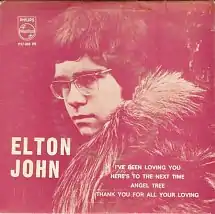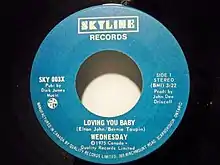I've Been Loving You
"I've Been Loving You" is the 1968 debut single by Elton John with lyrics credited to Bernie Taupin (although John later admitted that he wrote the song by himself, giving Taupin credit as an effort to earn Taupin his first publishing royalties). The B-side is "Here's to the Next Time", an Elton John composition. "I've Been Loving You" was not originally included on any album and the single was withdrawn shortly after its release. Neither side appeared on any official album release until the 1992 "Rare Masters" box set (which featured previously unreleased stereo mixes of both).
| "I've Been Loving You" | ||||
|---|---|---|---|---|
 | ||||
| Single by Elton John | ||||
| B-side | "Here's to the Next Time" | |||
| Released | 1 March 1968 | |||
| Recorded | February 1968 | |||
| Genre | Pop | |||
| Label | Philips (UK) | |||
| Songwriter(s) | Elton John, Bernie Taupin | |||
| Producer(s) | Caleb Quaye | |||
| Elton John singles chronology | ||||
| ||||
| "Loving You Baby" | ||||
|---|---|---|---|---|
 | ||||
| Single by Wednesday | ||||
| B-side |
| |||
| Released | March 1976 | |||
| Recorded | 1975 | |||
| Genre | Pop | |||
| Length | 3:22 | |||
| Label | Skyline (Canada) Celebration (U.S.) | |||
| Songwriter(s) | Elton John, Bernie Taupin | |||
| Producer(s) | John Dee Driscoll | |||
| Wednesday singles chronology | ||||
| ||||
The single is extremely rare.[1] An even rarer 4-song EP, released only in Portugal, contained two additional songs: "Thank You for All Your Loving" (written by John and then bandmate Caleb Quaye) and "Angel Tree" (the first true release of a John/Taupin composition).
According to John's YouTube channel, the single's b-side, "Here's to the Next Time," was recorded at DJM studios in late 1967.[2]
Wednesday cover
In 1976, the Canadian band Wednesday covered the song under the title "Loving You Baby". It was a substantial hit in their native country, peaking at #6 for two weeks on the Canadian singles charts.[3] It is ranked as the 78th biggest Canadian hit of 1976.[4]
Other cover versions
- On May 24, 1968 (shortly after Elton's release), Edwin Bee released it as a single, marking the first cover version of an Elton John composition.
References
- https://www.youtube.com/watch?v=iJ0A75pjnOg&feature=youtu.be&src=Linkfire&lId=a93e70e1-ec46-4537-94e2-c9f9d3164ee9&cId=d3d58fd7-4c47-11e6-9fd0-066c3e7a8751&utm_source=Rocket%20Club&utm_campaign=2c32db6a50-RocketClub-2020-10-16-HTTNT&utm_medium=email&utm_term=0_e31f64f7a7-2c32db6a50-43350473
- "Item Display - RPM - Library and Archives Canada". Collectionscanada.gc.ca. 1976-03-06. Retrieved 2018-10-23.
- "Top Singles – Volume 26, No. 14 & 15, January 08 1977". RPM. Library and Archives Canada. Archived from the original on March 19, 2016. Retrieved December 6, 2017.
- "Item Display - RPM - Library and Archives Canada". Collectionscanada.gc.ca. 1976-03-06. Retrieved 2018-10-23.
- "Top Singles – Volume 26, No. 14 & 15, January 08 1977". RPM. Library and Archives Canada. Archived from the original on March 19, 2016. Retrieved December 6, 2017.
External links
- Lyrics of this song at MetroLyrics
- Listen to "I've Been Loving You" on YouTube (Elton John)
- Listen to "Loving You Baby" on YouTube (Wednesday)
